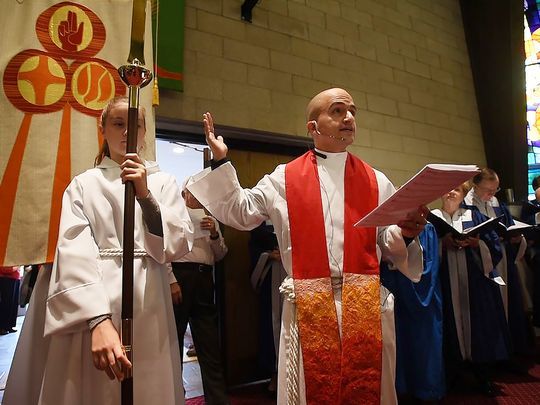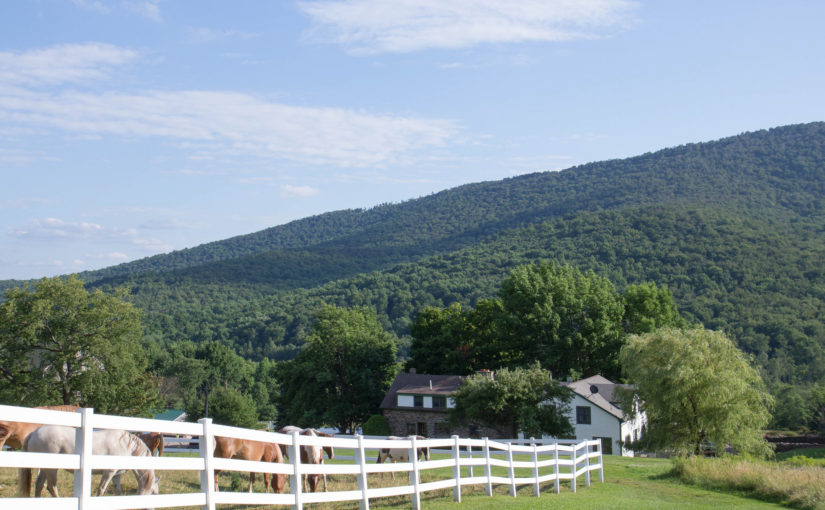Someone in the crowd said to him, “Teacher, tell my brother to divide the family inheritance with me.” But he said to him, “Friend, who set me to be a judge or arbitrator over you?” And he said to them, “Take care! Be on your guard against all kinds of greed; for one’s life does not consist in the abundance of possessions.” Then he told them a parable: “The land of a rich man produced abundantly. And he thought to himself, ‘What should I do, for I have no place to store my crops?’ Then he said, ‘I will do this: I will pull down my barns and build larger ones, and there I will store all my grain and my goods. And I will say to my soul, ‘Soul, you have ample goods laid up for many years; relax, eat, drink, be merry.’ But God said to him, ‘You fool! This very night your life is being demanded of you. And the things you have prepared, whose will they be?’ So it is with those who store up treasures for themselves but are not rich toward God.”
Luke 12:13-21
My sermon from the 8th Sunday After Pentecost (August 4, 2019) on Luke 12:13-21.
****
Imagine, for a moment, being at home. You’re sitting by the window, watching a thunderstorm head your way. Before too long, the clouds have darken the sky around you and the wind rushes through the trees. I’m going to assume that most of us, at some point, have watched a storm come near. But in our little scenario for today, I’d like you to imagine watching that storm in a different way. For those of us who are not little kids, imagine sitting by that window when you were 3 years old. I want you to think 3 year old thoughts and view the world in a 3 year old kind of way. I want you to sit by the window, stare and wonder. And while you do that, I want you to believe that the storm is more incredible than anything your parents could imagine.
Earlier this week on Twitter, I came across something shared by thousands of people. A mom was watching her little kid watch a storm outside their front window. The kid was lost in their own thoughts and was busy talking to herself. She said, to no one in particular, ““quiet…quiet. Kaboom comin.” And then, right after she said that, a huge crack of thunder filled the air. It was the kind of sound, I imagine, that would make us jump and maybe run away from the window. But not that little girl. Instead, in a whisper her mom could barely hear, she said to herself, “I did it.” The storm wasn’t something that happened to her. Rather, she believed she made the thunder happen.
Now, I’ve watched way too many movies and read way too many comic books to say that this little girl was wrong. She could be the next Thor, the god of thunder, who is now realizing the full extent of her powers. Yet, what really struck me about that tweet was how I reacted to it in many different ways. I wanted to high five that little girl for having an incredible amount of confidence in herself. And I also felt a little bit like a sap because what she said was pretty adorable. When I first saw that tweet, I literally laughed out loud because I found it funny. But I was also a bit jealous because I know nothing I’ve said will be enjoyed by the same amount of people who saw that mom’s tweet. Yet there was something else there, in our reactions to that tweet, that was left mostly unsaid. What made this tweet funny to us was the assumption that the little girl was being absurd because she didn’t know the limits to her own reality. Those of us who are older and, in theory – wiser, could come up with a dozen reasons to explain why her understanding of her situation was wrong. We have no problem rewriting her experience so that her sense of “I did it” ends up not being true. We’re pretty good at showing other people how their understanding of their reality is wrong. But do we, when were caught up in our own “I did it” moments, have the gumption, integrity, and ability to analyze ourselves in the very same way?
Because, as we see in our reading from the gospel according to Luke today, our “I’s” matter. Jesus was approached by someone in the crowd who was going through a family squabble. We don’t know all the details about their story but it’s possible a younger sibling wanted a piece of their family’s inheritance. They had, for cultural or family reasons, possibly received nothing and they wanted Jesus’ to intervene. Their request for an intervention was exactly that: a request that didn’t ask Jesus for his thoughts or his advice. Yet Jesus gave them his opinion anyways by inviting them to listen to a parable. And for the last two thousand years, the church has affectionately named the parable Jesus told: the rich fool.
Now the key to interpreting this parable is to pay attention to the I’s, that pronoun and letter, in the passage. After the rich farmer noticed his land producing more crops than he could ever use, he asked himself, “What should I do?” That’s a good question – one we should ask when abundance comes our way. Yet notice that question wasn’t directed to anyone but himself. And instead of just talking to himself, he answered himself as well. Not once did he seek out anyone else’s advice or think about anyone but himself. Which shows us the false reality that he lived in. Because there’s no way he could have planted, tended, and harvested such a large amount of food by himself. Other people were needed to make that harvest happen and yet all the rich farmer could say was, “I did it.” We also know, based on our own experience at the garden here at church: you can research, plan, and do everything correctly – but we still can’t make those plants grow. The land produces what it produces – and we don’t have as much control as we wish we did. The rich man could have named this reality, could have said thank you to the workers who made his harvest happen; and he could have thanked God for providing the rain, the sun, and the seed to make the land produce as much as it did. But he didn’t. Instead, he looked out his window at the abundant harvest he didn’t cause to fully happen on its own, and he said to himself, “I did it.”
We’re pretty good at claiming credit, at saying “I did it” when it suits us. And we’re also quick to deny that kind of credit when something interferes with the story we prefer to tell about ourselves. We often celebrate, high five each other, and act as if we were the players on our favorite sports teams when they win a national championship. We easily make their victory into a version of our own. But we also distance ourselves from those moments in our country or in our collective life together that we claim are not part of who we are. We separate ourselves from the fact that things like mass shootings happen in our country every day – from garlic festivals in California to Walmarts in El Paso and, as I woke up this morning, to bars in Dayton, Ohio. We choose to act as if we are not truly part of this reality that we’re already in. Our “I did its,” when stated without reflection or even gratitude, is an attempt by us to imagine we live in a world different from the one we’re truly in. Yet Jesus chose to stay in the real one – in the place where God’s reality confronts and reveals the truth about our own. God names our hurts, our failures, our brokenness, and the ways we let the focus on ourselves, our love of the “I’s,” blind us from seeing the truth and the people who are around us. God names our world as it truly is – yet God also chooses to not let us stay there. Instead, Jesus is already present here, revealing to us what God’s reality, God’s kingdom, can actually be. When we follow Jesus, when we feed others like he did, heal communities like he did, stand up against violence and hate like he did, and when welcome all people like he did – we end up seeing, in a flash, what God’s kingdom is all about. Now, none of that work is easy. It takes guts and courage to reflect on our “I did it” moments with nuance, humility, and gratefulness. It’ll also take hard truths for each of us to own every one of our communal “I did it” realities – including those things we wish weren’t true. Yet we don’t go about this work on our own. Because, in our baptism and in our faith, we have Jesus. And when we cling to him, hold onto him, and work to align our lives away from ourselves and instead towards God and our neighbor*, our world and our community will end up being rocked by a different kind of thunder: one filled with hope, mercy, and a love that will carry us through every storm.
Amen.
*http://www.workingpreacher.org/preaching.aspx?commentary_id=4048



